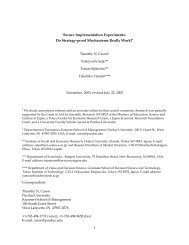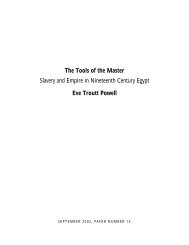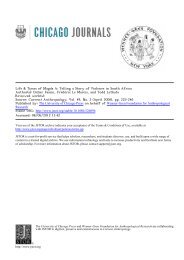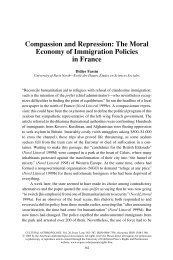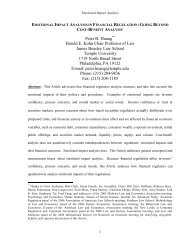Governance, Growth, and Development Decision-making - School of ...
Governance, Growth, and Development Decision-making - School of ...
Governance, Growth, and Development Decision-making - School of ...
Create successful ePaper yourself
Turn your PDF publications into a flip-book with our unique Google optimized e-Paper software.
It is also not necessary (<strong>and</strong> in fact <strong>of</strong>ten not even productive)<br />
for international organizations in general, <strong>and</strong> the World Bank in<br />
particular, to look at the most current research to decide their dayto-day<br />
business. Academic research progresses slowly <strong>and</strong> according<br />
to its own dynamics, which <strong>of</strong>ten reward ideas that are contrarian<br />
even if they have little empirical relevance. Only ideas that have<br />
withstood the test <strong>of</strong> time will one day become relevant for the policy<br />
sphere. Having said that, there is now a sufficient body <strong>of</strong> work<br />
<strong>and</strong> a broad enough consensus on the importance <strong>of</strong> institutions <strong>and</strong><br />
governance that it might be useful to contemplate what the lessons<br />
<strong>of</strong> this body <strong>of</strong> academic work are for the World Bank.<br />
So what have we learned with the research <strong>of</strong> the past decade or<br />
so that can be useful to policymakers? My answer to this question<br />
can be summarized in six points.<br />
1. Institutions Matter<br />
The institutions <strong>of</strong> a country may create incentives for investment<br />
<strong>and</strong> technology adoption, for its businesses to invest, <strong>and</strong> the opportunity<br />
to accumulate human capital for its workers, thus engendering<br />
economic growth. Or they may discourage such activities, leading<br />
to stagnation. They may create incentives for politicians to work<br />
towards creating a growth-enhancing environment. Or they may<br />
encourage rent seeking activities, corruption, <strong>and</strong> the unfettered<br />
pursuance <strong>of</strong> personal gain at great cost for the rest <strong>of</strong> the society.<br />
While there is relatively strong evidence showing that the broad<br />
cluster <strong>of</strong> institutions—comprising economic, political, <strong>and</strong> legal<br />
aspects—are essential for long-run economic development, we<br />
must be modest <strong>and</strong> admit that we are still at the beginning <strong>of</strong> the<br />
process <strong>of</strong> underst<strong>and</strong>ing how exactly specific aspects <strong>of</strong> institutions<br />
influence economic outcomes. For example, we can be fairly<br />
confident that today South Korea is much richer than North Korea<br />
because <strong>of</strong> its divergent (<strong>and</strong> more growth-enhancing) institutional<br />
path. But we do not know whether this is mostly because <strong>of</strong> South<br />
Korea’s economic institutions that protect property rights, because<br />
<br />
<strong>Governance</strong>, <strong>Growth</strong>, <strong>and</strong> <strong>Development</strong> <strong>Decision</strong>-<strong>making</strong>



